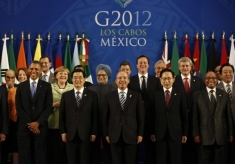No Surprises in G-20 Declaration, Progress Report
Tuesday's G-20 Leaders' Declaration, and a progress report from the G-20 Development Working Group, brought no surprises. Both note support for the implementation of eleven large infrastructure projects, among them the massive Grand Inga Dam in the Democratic Republic of Congo. More worrisome, however, is that these projects could be "pre-approved" for public and private financing before even feasibility studies are completed.
Paragraph 65 of the Leaders' Declaration spells out the G-20's continued support of the projects, stating that "investment in infrastructure is critical for sustained economic growth, poverty reduction, and job creation. We therefore welcome the strong progress made under the Multi-Year Action Plan, including in implementing the recommendations of the Multilateral Development Banks’ (MDBs) Action Plan and the High Level Panel on Infrastructure."
Accordingly, the progress report of the Development Working Group, tasked with setting the G-20's recommendations for "inclusive green growth," infrastructure, and food security, notes that preparation to implement many of the projects has already begun. Paragraph 17(e) states that the G-20 welcomes "the progress made on, and lessons learned from, most of the eleven exemplary investment projects highlighted in Cannes."
However, it is unclear what progress has been made on the Grand Inga Complex. AECOM and Electricité de France (EDF) were awarded a US$ 13.4 million contract to develop the mega-project's most recent feasibility studies on February 1, 2011. As of yet, however, there has been no sign of a completed study. International Rivers' requests to obtain a copy of this latest feasibility study and any environmental impact assessment have gone unanswered.
 Of perhaps greater concern is that the B-20's recommendations to the G-20 have called for fast-tracking investment in the eleven projects, and for regulators to make "concerted, coordinated efforts" to pre-approve them. The recommendation reflects a worrisome trend towards the political approval of controversial infrastructure projects before completion of necessary technical-economic feasibility studies and environmental studies.
Of perhaps greater concern is that the B-20's recommendations to the G-20 have called for fast-tracking investment in the eleven projects, and for regulators to make "concerted, coordinated efforts" to pre-approve them. The recommendation reflects a worrisome trend towards the political approval of controversial infrastructure projects before completion of necessary technical-economic feasibility studies and environmental studies.
Nowhere has the trend been more evident than in Brazil. Project pre-approval, fast-track investment, and the piecemeal approval of feasibility and environmental studies has led to the construction of highly controversial large dams in the Brazilian Amazon. The Brazilian Congress pre-approved the Santo Antônio and Jirau dams on the Madeira River before feasibility studies were completed in 2007; pre-approved the Belo Monte Dam on the Xingu River in 2005 before feasibility studies were completed in 2009; and this year pre-approved four of the planned dams on the Tapajós and Jamanxim Rivers without the existence of any feasibility studies. If the example set by Brazil is any indication of the possible pre-approval of Grand Inga, what would be the world's largest dam is in for a future of costly legal challenges and severe reputational risk.
What's interesting about the progress report of the Development Working Group is that it also notes that "inclusive, green growth" offers opportunities for "gains in efficiencies, innovation, inclusion and resilience to environmental shocks." We wonder out loud how the world's largest hydropower scheme would be more efficient, innovative, inclusive, and resilient to environmental shocks than any broad-based, decentralized infrastructure scheme employing newer, cleaner, and greener technologies.
With the amount of public and private investment that is being discussed by the G-20, a truly green infrastructure sector could be created that didn't advance the disappearance of freshwater biodiversity. Better opportunities exist, if G-20 countries want them.



